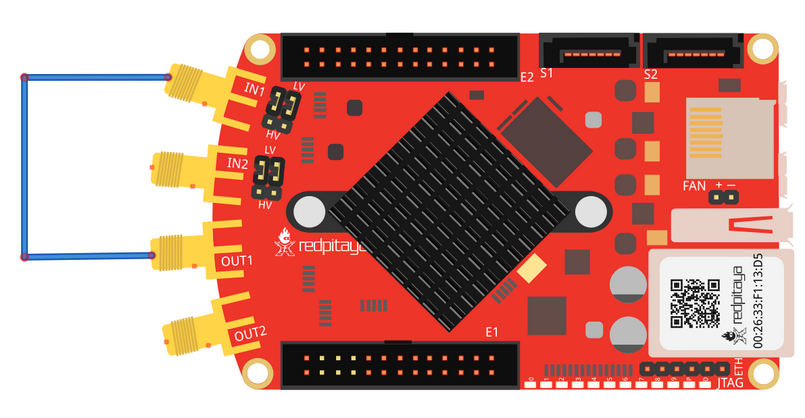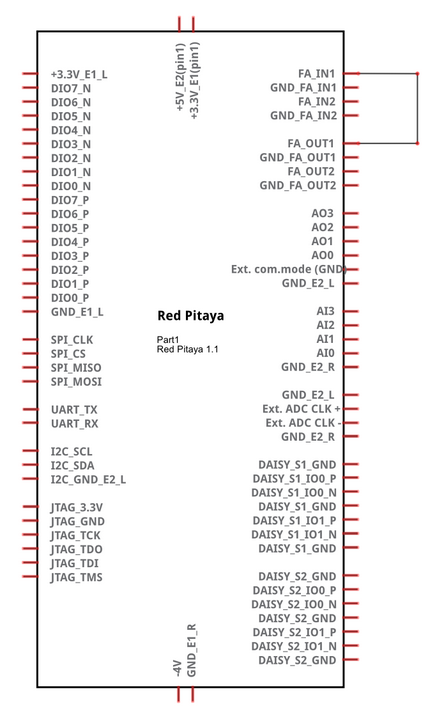2.3.6.5.2. Generating a signal and checking its shape
2.3.6.5.2.1. Description
This example shows how to acquire 16k samples of signal on fast analog inputs. The signal will be acquired simultaneously with the generated signal. The generator generates a signal with a frequency of 20 kHz and an amplitude of 1 Volt. And on the ADC, the frequency, amplitude, and signal shape are checked.
2.3.6.5.2.2. Required hardware
Red Pitaya device
Wiring example for STEMlab 125-14 & STEMlab 125-10:

2.3.6.5.2.3. Circuit

2.3.6.5.2.4. API Code Examples
Note
This code is written for 2.00-23 or higher OS. For older OS versions, please check when specific commands were released (a note is added to each command introduced in 2.00 or higher verisons).
Note
The API code examples don’t require the use of the SCPI server. Instead, the code should be compiled and executed on the Red Pitaya itself (inside Linux OS). Instructions on how to compile the code and other useful information are here.
2.3.6.5.2.4.1. Code - C API
/* Red Pitaya C API example of Generating and acquiring a signal on a specific channel
then checking the signal shape */
#include <stdio.h>
#include <stdlib.h>
#include <unistd.h>
#include <math.h>
#include <string.h>
#include "rp.h"
#define EPS 0.05
#define EPS_F 100
const float c_osc_fpga_smpl_freq = ADC_SAMPLE_RATE;
const int c_meas_time_thr = ADC_BUFFER_SIZE / (1000000000 / ADC_SAMPLE_RATE);
const float c_meas_freq_thr = 0.05;
const float c_min_period = 19.6e-9; // 51 MHz
void filterBuffer(float *_buffer,int _size){
float *n_b = malloc(_size * sizeof(float));
memcpy(n_b,_buffer,_size);
float core[] = { 1.0 / 8.0 , 1.0 / 4.0 , 1.0 / 4.0 , 1.0 / 4.0 , 1.0 / 8.0};
for(int i = 2 ; i < _size - 2 ; i++ ){
float sum = 0;
for (int j = -2 ; j <= 2 ; j++ ){
sum += core[j + 2] * _buffer [i + j];
}
n_b[i] = sum;
}
memcpy(_buffer,n_b,_size);
free(n_b);
}
bool checkAmplitudeAndFreq(float *_buff, uint32_t _size,float _nominal,float *min, float *max,float *frequency){
int trig_t[2] = { 0, 0 };
int trig_cnt = 0;
int state = 0;
if (_size > 0){
*min = _buff[0];
*max = _buff[0];
for (int i = 1 ; i < _size ; ++i){
if (*min > _buff[i]) *min = _buff[i];
if (*max < _buff[i]) *max = _buff[i];
}
uint32_t dec_factor = 1;
rp_AcqGetDecimationFactor(&dec_factor);
float acq_dur=(float)(_size)/((float) c_osc_fpga_smpl_freq) * (float) dec_factor;
float cen = (*max + *min) / 2;
float thr1 = cen + 0.2 * (*min - cen);
float thr2 = cen + 0.2 * (*max - cen);
float res_period = 0;
for(int i = 0; i < _size; i++) {
float sa = _buff[i];
if((state == 0) && (sa < thr1)) {
state = 1;
}
if((state == 1) && (sa >= thr2) ) {
state = 0;
if (trig_cnt++ == 0) {
trig_t[0] = i;
} else {
trig_t[1] = i;
}
}
if ((trig_t[1] - trig_t[0]) > c_meas_time_thr) {
break;
}
}
if(trig_cnt >= 2) {
res_period = (float)(trig_t[1] - trig_t[0]) / ((float)c_osc_fpga_smpl_freq * (trig_cnt - 1)) * dec_factor;
}
if( ((thr2 - thr1) < c_meas_freq_thr) ||
(res_period * 3 >= acq_dur) ||
(res_period < c_min_period) ){
res_period = 0;
}
float period = res_period * 1000.f;
period = (period == 0.f) ? 0.000001f : period;
*frequency = (float) (1 / (period / 1000.0));
if ((fabs(*min + _nominal) < EPS) && (fabs(*max - _nominal) < EPS))
return true;
return false;
}
return false;
}
float trapezoidalApprox(double *data, float T, int size){
double result = 0;
for(int i = 0; i < size - 1; i++){
result += data[i] + data[i+1];
}
result = ((T / 2.0) * result);
return result;
}
bool isSineTester(float *data, uint32_t size) {
uint32_t dec_factor = 1;
rp_AcqGetDecimationFactor(&dec_factor);
double T = (dec_factor / ADC_SAMPLE_RATE);
double ch_rms[size];
double ch_avr[size];
for(int i = 0; i < size; i++) {
ch_rms[i] = data[i] * data[i];
ch_avr[i] = fabs(data[i]);
}
double K0 = sqrtf(T * size * trapezoidalApprox(ch_rms, T, size)) / trapezoidalApprox(ch_avr, T, size);
return ((K0 > 1.10) && (K0 < 1.12));
}
int main(int argc, char **argv){
bool fillState = false;
int counter=100;
/* Print error, if rp_Init() function failed */
if(rp_Init() != RP_OK){
fprintf(stderr, "Rp api init failed!\n");
}
/* Reset Generation and Acquisition */
rp_GenReset();
rp_AcqReset();
/* Generation */
rp_GenFreq(RP_CH_1, 20000.0);
rp_GenAmp(RP_CH_1, 1.0);
rp_GenWaveform(RP_CH_1, RP_WAVEFORM_SINE);
rp_GenOutEnable(RP_CH_1);
/* Acquisition */
uint32_t buff_size = 16384;
float *buff = (float *)malloc(buff_size * sizeof(float));
rp_AcqSetDecimation(RP_DEC_8);
rp_AcqSetTriggerLevel(RP_CH_1, 0);
rp_AcqSetTriggerDelay(ADC_BUFFER_SIZE/2.0);
while(counter--){
fillState = false;
rp_AcqStart();
/* After the acquisition is started some time delay is needed to acquire fresh samples into buffer
Here we have used a time delay of one second but you can calculate the exact value taking into account buffer
length and sampling rate */
sleep(1);
rp_AcqSetTriggerSrc(RP_TRIG_SRC_CHA_PE);
rp_acq_trig_state_t state = RP_TRIG_STATE_TRIGGERED;
while(1){
rp_AcqGetTriggerState(&state);
if(state == RP_TRIG_STATE_TRIGGERED){
break;
}
}
// !! OS 2.00 or higher only !! //
while(!fillState){
rp_AcqGetBufferFillState(&fillState);
}
rp_AcqStop();
rp_AcqGetOldestDataV(RP_CH_1, &buff_size, buff);
filterBuffer(buff,buff_size);
printf("Acquiring Done\n");
float min = 0;
float max = 0;
float frequency = 0;
bool isBrokenSignal = false;
if (checkAmplitudeAndFreq(buff,buff_size,1.0, &min , &max , &frequency)) {
printf("\tAmplitude is correct MIN = %0.4f , MAX = %0.4f\n",min,max);
} else{
printf("\tAmplitude is not correct MIN = %0.4f , MAX = %0.4f\n",min,max);
isBrokenSignal = true;
}
if (fabs(frequency - 20000.0) < EPS_F) {
printf("\tFrequency is correct %0.4f\n",frequency);
} else{
printf("\tFrequency is not correct %0.4f\n",frequency);
isBrokenSignal = true;
}
if (isSineTester(buff,buff_size)){
printf("\tSignal form is sine\n");
} else{
printf("\tSignal form is not sine\n");
isBrokenSignal = true;
}
printf("Signal is %s\n\n",isBrokenSignal ? "not correct" : "correct");
}
/* Releasing resources */
free(buff);
rp_Release();
return 0;
}